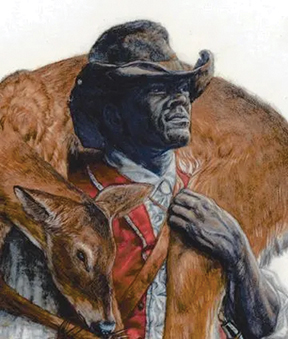By Don Valentine
Another omission in the historical curriculum is the crucial role a slave played in the Lewis & Clark expedition. The only Black man on the crew was a robust slave named York. When Clark was a little boy his father gave him York as personal “body servant.” Like many slaves, York didn’t have a legal right to a surname. According to “In Search of York, by author Robert B. Betts, “York was born into slavery, the son of “Old York” and Rose, two enslaved laborers owned by Clark’s father…”
Lewis and Clark were commissioned in 1803 to explore the Louisiana Purchase and the Pacific Northwest. The Smithsonian Magazine noted, “They selected soldiers that had demonstrated bravery in battle. They chose interpreters and French oarsmen who knew the country better than they. And they chose York, Clark’s 6-feet, 200-pound body servant.” A 6-foot man 220 years ago is likely 6’ 3” today. Clark decided that was a prime selection for his “Body Servant” and protector in the wild hinterlands.
York was a vital cog on the mission. He hunted for badly needed food, smoothed relations with Native American tribes, cared for the ill and helped discover new plants and animals. The Native tribe that owned most of the area the expedition crossed was called the Nez Perce. York became the de facto ambassador for Clark’s team. Smithsonian Magazine commented on York’s appeal, “Clark encouraged the Nez Perce they encountered to closely examine York and mentions in his journal goading him to ‘perform’ as, alternately, a frightening monster or as a harmless dancing buffoon…” Clark not only humiliated his servant, but bragged about dispensing sadistic abuse on his servant. A Washington Post article cited an excerpt from a letter Clark wrote to his brother, “I gave him a severe trouncing the other day and he has much mended.”
On their expedition York showed the character of a good man. Clark was about to drown in the waters of a flash flood and York risked his life to save Clark. Most people would have recalled all the beatings, mistreatment, and developed a severe leg cramp, “Sorry massa!” In 1806 the men returned home to newfound fame, land grants and financial awards. The exception was the man who saved Clark’s life. Clark refused to give him his freedom. The details of York’s last years are sketchy. Betts writes, “it is reasonably certain that he was manumitted sometime between 1811 and 1815.” York died of cholera circa 1832.


